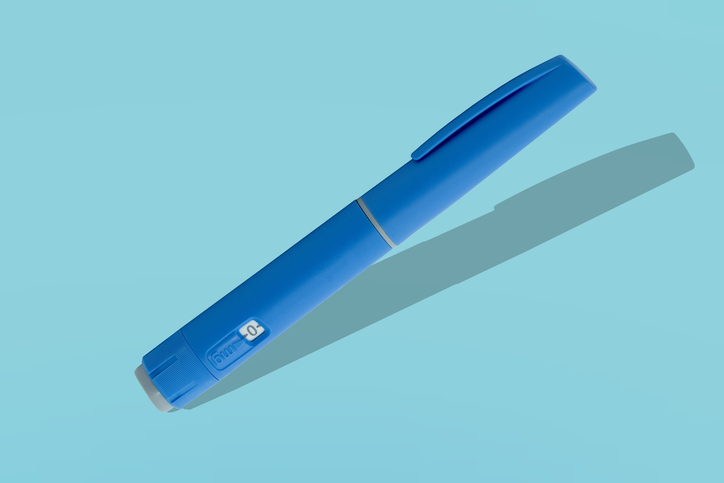Danika Berry has lived many years in physical and mental pain. As an adult, she was diagnosed with premenstrual dysphoric disorder, known as PMDD, a much more severe form of PMS that causes extreme mood shifts capable of completely disrupting lives. Those are just the emotional effects. Physically speaking, just before the luteal phase of her menstrual cycle, she’d gain anywhere from five to ten pounds every month from binge eating and extreme bloating.
Berry dreaded her period and said she only had two weeks of normalcy out of the month before the PMDD symptoms would kick in. Sometimes they were so severe she’d be faced with suicidal ideations.
Despite building an enviable life as a respected celebrity publicist, beauty entrepreneur, and doting mother, she was seldom able to enjoy the fruits of her labor because her mind and body simply wouldn’t allow it. That is until a simple question from her doctor about semaglutide injections changed her life.
“Do I want to try it?” The it in question was semaglutide, an injectable drug that was initially only used as diabetes medication. It has been discovered as a solution for stubborn weight loss, prompting everyone from A-List actors and popular reality stars to everyday people to get on it.
Within the last few years, the drug has reached much fanfare, with many touting its effectiveness in helping them shed nearly impossible to lose pounds in a short amount of time.
Semaglutide Weight Loss
“It has literally improved everything for me,” Berry tells HelloBeautiful. She started with weekly injections of semaglutide, but moved up to Ozempic, which is the same drug but in a higher dosage. According to her, that small shift made a seismic difference.
“My entire life is better. My appetite is regulated. No more suicidal thoughts, I’ve lost twenty pounds over the course of the last few months and I’m joyful again. The only thing I have to worry about is staying hydrated and staying on top taking supplements to keep my energy up. I haven’t felt like this since I was in my twenties.”
With every good though, comes the bad. Reports of shortages of semaglutide, and its big sister Ozempic (the branded name) have muddied the crystal waters, stating that those who have long taken the drug to manage diabetes symptoms were having a hard time accessing it because of those snatching it up just to lose vanity weight.
Take comedic actor Anthony Anderson, for example, who recently made headlines when he said “It’s creating a shortage for those of us who need the medicine that we need and not for weight loss issues, but for our health.” He has shared his journey with weight loss and diabetes publicly throughout his career.
Like him, many others have criticized the trend, pointing out that those taking it just to shake off extra weight should be leery since there isn’t much research on the long-term effects for non-diabetics. Some physicians are working to counter and quell those heightened concerns.
“It’s fear-mongering,” said Dr. Angelina Postoev. She is a triple-board certified cosmetic surgeon with the IBI HealthCare Institute, a center that specializes in general surgery, bariatric weight loss surgery, and plastic/cosmetic surgery.
“I say that because this drug has been prescribed and used for many years before it became popular, and guess what? Prior to that, we didn’t have to stop the medication one week prior to surgery like it is now. Before now, nobody died of vomiting. Nobody had any issues like that with the drug the way it’s being described in the news. The side effects were not talked about because they weren’t really there.”
She’s referring to the widely reported account of Trish Webster’s death, an Australian woman who passed away of acute gastrointestinal illness after being on Ozempic for a short time. According to reports, she was taking it to shed a few pounds for her daughter’s wedding. Shortly after she complained of severe nausea, vomiting, and diarrhea, her physician switched her to Saxenda, a liraglutide injectable that would have the same weight loss effect without the discomfort. It was suggested that the drug led to her passing, but Dr. Postoev said there are other contributing factors to consider before solely placing blame in one place.
Semaglutiude Pros And Cons
“As physicians, we are tasked with following the symptoms of our patients very closely when introducing them to new medications like this,” she tells HelloBeautiful. So, if you’re getting to the point of vomiting, you’re not to keep taking the drug—you’re supposed to come talk to me and we’re going to discuss what we can do to not necessarily quit the drug, but avoid the complications.” She says that if she had a patient in the same situation, she would’ve deduced that her body was incompatible with the drug, and recommended she stop taking it altogether.
“If it gets to the point of vomiting, that’s usually beyond the typical,” she said, going on to explain that most of her patients have seen positive results from usage of Ozempic.
One example of that is Lisa Walker, an Atlanta, GA-based operational manager who sought help for weight loss with Dr. Postoev in 2022. For years she’d monitored her diet and exercise habits to get to a healthy place to no avail. Before being prescribed weekly Ozempic injectables, she described her relationship with her health as a “rollercoaster.”
“I was working long hours, holding a lot of stress and a lot of weight that I could not move,” Walker says. “I mean, from taking lunch breaks, going on walks, trying to be really mindful of what I was eating. And I do believe it had a lot to do with stress, that I was carrying a lot of weight until my breaking point came when I went to go see Dr. Angelina and I started taking the shots.”
After about six months she lost 50 pounds.
“Of course, it’s changed the way I look and feel, but more than anything it has changed the way I think,” Walker explains.
Dr. Postoev attributes this to the elimination of “food noise,” which is the internal dialogue people have with themselves about food.
Semaglutide For Black Women
“I don’t think about my next meal shortly after just eating,” Berry says. “My entire life used to revolve around eating because that was one of the few things that brought me easy joy besides my kids. Now I can enjoy every part of my life in a way I haven’t been able to in a long time. It’s truly a miracle.”
Ironically, both Walker and Berry also shared that the near-instant weight loss helped them prioritize exercise and nutrition.
“We’re taught that it should be the other way around—you are supposed to work for weight loss and there’s this shame around being overweight, even when you’re doing all the things you can to change that,” Dr. Postoev says. “Obesity is a disease, but it’s almost like we need permission to treat it that way in this country. With any other disease, if there is a shot, or procedure to cure it, we welcome it with open arms—but with this, you almost have to earn the cure.”
Her astute observation echoes a reality most Black women face in almost every other area of their lives—the requirement of having to earn everything. As the trope says—Black people have to work twice as hard to get half as much. That is doubly true for Black women.
The group outpaces all others in the US when it comes to starting businesses, is more educated than their Black male counterparts and are more likely to be the breadwinners in their households.They’ve proven themselves to almost always lean on their merit.
What’s more, weight discrimination can be incredibly damaging to our well-being. But fatphobia can adversely affect nearly every other aspect of our lives as well.
According to a May 2023 report released by mental health service provider Within, 1 in 10 workers said their decision to quit their job was linked to their body, while 39% of people felt they were laid off because of a body size bias at work. The report revealed that 61% of employees in larger bodies felt their body size factored into whether they received a promotion, with over 3 in 10 less likely than other employees to get promoted. Additionally, only 38% of employees in larger bodies experienced a raise last year, compared to other employees (48%).
Medical experts have overwhelmingly supported the increased usage of Ozempic for weight loss, which can reduce the risk for many other serious health conditions. But for whatever reason, detractors still take issue with people using it, particularly Black women. We all know why (ahem, misogynoir)—but I think it’s high time for us to allow them to take the magic pill, or in this case, shot, in peace. Black women are owed that much.
Two Black Women Share How Ozempic Changed Their Lives For The Better was originally published on hellobeautiful.com




















